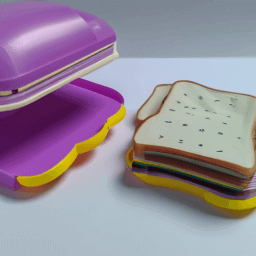Understanding sandwich maker materials for durability and performance
To ensure durability and performance of a sandwich maker, it is important to understand the materials used in its construction. Stainless steel is a popular choice for the body and plates as it is durable and easy to clean. Non-stick coatings are also commonly used for easy release of food and easy cleaning. Cast iron plates are heavy and distribute heat evenly, but require seasoning and maintenance. Ceramic plates are known for their non-toxic and non-reactive properties, but can be fragile. Aluminum plates are lightweight and heat up quickly, but can warp over time. Understanding the pros and cons of each material can help in choosing a sandwich maker that meets your needs.
Sandwich makers have become an essential appliance in modern kitchens. They are versatile, easy to use, and can make a variety of delicious sandwiches in a matter of minutes. However, not all sandwich makers are created equal. The materials used in their construction can have a significant impact on their durability and performance. In this article, we will discuss the most common materials used in sandwich makers and their pros and cons.
Non-Stick Coating
Non-stick coating is a popular choice for sandwich makers. It is a layer of material that is applied to the cooking plates to prevent food from sticking. Non-stick coating is made from a variety of materials, including Teflon, ceramic, and silicone. It is easy to clean and requires little to no oil, making it a healthier option. However, non-stick coating can wear off over time, especially if it is scratched or scraped. It can also release toxic fumes if it is overheated.
Stainless Steel
Stainless steel is a durable and long-lasting material that is often used in sandwich makers. It is resistant to rust and corrosion and can withstand high temperatures. Stainless steel sandwich makers are easy to clean and maintain, and they look sleek and modern. However, stainless steel does not have non-stick properties, so food may stick to the cooking plates. It also takes longer to heat up than other materials, which can be a disadvantage if you are in a hurry.
Aluminum
Aluminum is a lightweight and affordable material that is commonly used in sandwich makers. It heats up quickly and evenly, making it a good choice for cooking sandwiches. Aluminum sandwich makers are also easy to clean and maintain. However, aluminum is prone to scratches and dents, which can affect its performance. It can also react with acidic foods, such as tomatoes, and leave a metallic taste.
Cast Iron
Cast iron is a heavy and durable material that is often used in sandwich makers. It heats up slowly but retains heat well, making it a good choice for cooking sandwiches. Cast iron sandwich makers are also non-stick and can be used on a variety of heat sources, including stovetops and grills. However, cast iron is prone to rust and requires seasoning to prevent food from sticking. It is also heavy and can be difficult to handle.
Ceramic
Ceramic is a non-toxic and eco-friendly material that is becoming more popular in sandwich makers. It heats up quickly and evenly and is non-stick, making it easy to clean. Ceramic sandwich makers are also durable and long-lasting. However, ceramic can be brittle and prone to cracking or chipping if dropped or mishandled. It is also more expensive than other materials.
Conclusion
Choosing the right material for your sandwich maker is essential for its durability and performance. Non-stick coating is a popular choice, but it can wear off over time and release toxic fumes. Stainless steel is durable and long-lasting, but it does not have non-stick properties. Aluminum is lightweight and affordable, but it is prone to scratches and dents. Cast iron is heavy and durable, but it requires seasoning and can be difficult to handle. Ceramic is non-toxic and eco-friendly, but it can be brittle and expensive. Consider your needs and preferences before choosing the material for your sandwich maker.
| Material | Pros | Cons |
|---|---|---|
| Non-Stick Coating | Easy to clean, requires little to no oil, healthier option | Wears off over time, can release toxic fumes if overheated |
| Stainless Steel | Durable, long-lasting, resistant to rust and corrosion | Does not have non-stick properties, takes longer to heat up |
| Aluminum | Lightweight, affordable, heats up quickly and evenly | Prone to scratches and dents, can react with acidic foods |
| Cast Iron | Heavy, durable, retains heat well, non-stick | Prone to rust, requires seasoning, difficult to handle |
| Ceramic | Non-toxic, eco-friendly, heats up quickly and evenly, non-stick | Brittle, prone to cracking or chipping, expensive |
| By www.zelect.in | ||
Sharing is caring!
Facebook Twitter Email
Recommended articles for Sandwich Maker
Sandwich Maker types and buying guide
-
Sandwich maker buying guide. How to choose the right sandwich maker for your kitchen
-
Sandwich maker vs. toaster: Which is better for you?
-
Exploring different types of sandwich makers?
-
The pros and cons of non-stick sandwich makers
-
Key features to consider when purchasing a sandwich maker
-
Understanding different types of sandwich makers
-
Comparing sandwich makers with other kitchen appliances
-
Understanding sandwich maker power and wattage for efficient cooking
-
Understanding sandwich maker materials for durability and performance


